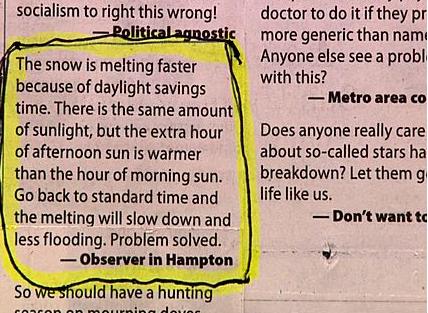The earth has swallowed a river in Costa Rica.
I’ll leave the potential metaphors to commenters.
The earth has swallowed a river in Costa Rica.
I’ll leave the potential metaphors to commenters.
The opposite of confirmation bias? You see this a lot in space policy discussions.
This is a pretty funny anti-CFL rant.
Congratulations to Sarah Hoyt, who has won this year’s Prometheus . Here’s the press release.
Here’s a list of previous winners. I’m struck by how few of them I’ve read. Perhaps I should rectify that.
Some questions.
…the more you disagree:
On the whole, the most scientifically literate and numerate subjects were slightly less likely, not more, to see climate change as a serious threat than the least scientifically literate and numerate ones.
Obviously, this doesn’t surprise me at all.
…is being driven by women:
Most women would not have thought to carry a gun even five years ago, said Andrea Durhal. When she became a National Rifle Association certified instructor eight years ago, her classes were mostly men. Recently, women have started to fill her classes.
It took a few years for women to get over a fear of guns and take responsibility for their protection, she said.
“We’re being victimized; we’re being raped. The crimes are getting higher and the police departments are less and less,” she said. “People are realizing now that they need to be their own security.”
There’s a very interesting graphic there. The highest percentages of women getting permits is Wayne County (Detroit) and Barry County (Grand Rapids). I would have thought that Genessee (Flint) and Oakland (Pontiac) Counties would be equally high, but they’re slightly less. I wonder why?
Why didn’t I think of this?

[Via Paul Hsieh, on Facebook]
Diet soda makes you fat? As suggested, the only non-alcoholic beverage I drink is water. Almost everything else looks bad for you in various ways (unless you need to replenish your electolytes). Well, coffee is maybe OK, but I’ve never acquired the taste for it. And I don’t like hot beverages.
I’ve always thought that progeria was sort of an existence proof that the aging process is a lot more amenable to external intervention than many want to believe. After all, if it can be accelerated on such a grand scale, why not be able to slow, or even reverse it? Yes, I know that some people think it’s a violation of the Third Law, but I don’t buy it. We do cellular repair perfectly well for years before it starts to decline, and if the repair mechanisms can be made to work again, there is no law of thermodynamics that says we can reduce the entropy again.
So this is a very exciting development, with profound societal implications if it pans out:
The drug rapamycin has been found to reverse the effects of Hutchinson-Gilford progeria syndrome, a fatal genetic disease that resembles rapid aging, in cells taken from patients with the disease. Rapamycin, an immunosuppressant drug used to prevent rejection of transplanted organs, has already been shown to extend life span in healthy mice. Researchers hope the findings will provide new insight into treating progeria as well as other age-related diseases.
As Glenn says, faster, please.